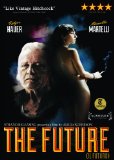| Reviews & Columns |
|
Reviews DVD TV on DVD Blu-ray 4K UHD International DVDs In Theaters Reviews by Studio Video Games Features Collector Series DVDs Easter Egg Database Interviews DVD Talk Radio Feature Articles Columns Anime Talk DVD Savant Horror DVDs The M.O.D. Squad Art House HD Talk Silent DVD
|
DVD Talk Forum |
|
|
| Resources |
|
DVD Price Search Customer Service #'s RCE Info Links |
|
Columns
|
|
|
Il Futuro aka The Future (2013)
The Future, adapted from a novel by Roberto Bolano by director Alicia Scherson, is a bizarre coming-of-age tale that splits its time between ruminations on how the world changes following a traumatic experience, and otherworldly sex scenes between Martelli (usually fully naked) and Hauer (usually fully clothed). The Bolano novel was made up of sixteen short stories, and it seems very likely that Scherson has only adapted one of them, resulting in a film that feels distinctly incomplete. The Future doesn't tell a story so much as capture a moment, and sadly, as skilled at Scherson may be at capturing the uncertainty of such a moment, the film doesn't have much insight on the experience.
Although Martelli's performance is often captivating, the character of Bianca is so lost in her own mind that there's not much for the viewer to latch onto either. Her existential indecisiveness, for all intents and purposes, is the character, a challenging approach that Scherson and Martelli fully convey without casting it in any particular light. There is a sense that we are supposed to understand why she answers a magazine quiz question like "When do you want to die?" with "Before forty. Thirty-eight," or at least understand something about her, but it reads as a generic, vague depression. She insinuates to her brother that she is not a virgin, but her decision to sleep with one of her brother's new roommates, then with Maciste, suggest a teenager exploring the freedom that comes with the assignment of adult responsibility.
The heart of the film, theoretically, is the time Bianca spends with Maciste, who lives alone in a dusty mansion that he knows by heart. He talks wistfully about his time as a movie star, briefly telling stories about the people he once knew, but he too is not a particularly interesting character. Hauer is not disengaged from the material, but can't find much of a footing. Although he denies an emotional attachment to Bianca, the lack of chemistry between Hauer and Martelli appears to be unintentional, despite scenes of his weathered hands rubbing her youthful naked body with oil. Before long, Bianca has become too attached to Maciste to betray him for two houseguests she doesn't like, but again, there's not much vitality in their relationship, and her transition is not particularly dramatic.
Throughout the film, Scherson drops hints of ideas that feel almost like science fiction, about the world physically transforming in the wake of a traumatic event. When she and her brother go to see their parents' car, the car presented by the police is white. She tells them the original car was yellow. The cop apologizes for the discrepancy, but insists that these kinds of things happen in a crash. Shortly thereafter, she finds herself oddly blinded by the light shining in through the windows of their home, and after her first night with Maciste, she senses the layout of the hair salon where she works has shifted. There's an interesting idea here, but Scherson doesn't pursue it, preferring to wander through Bianca's slow and slight journey of self-discovery. Sadly, The Future is not about the film's destination, but an idea that exists on the horizon; the film is stuck in the present, and the present is not very compelling.
The DVD, Video, Audio, and Extras
Although I suspect this is final copy, DVDTalk was sent a disc in a paper sleeve, so I cannot offer definitive assessment of the picture, audio, packaging, or extras. This copy contains a 1.78:1 anamorphic widescreen presentation of the film with an Italian Dolby Digital 5.1 soundtrack, English subtitles for the Italian dialogue (no fully captioned track is available), and a gallery of trailers for other Strand Releasing titles as the only bonus material.
Conclusion
Despite some intriguing ideas, The Future is pretty much a speculative bore. Skip it.
Please check out my other DVDTalk DVD, Blu-ray and theatrical reviews and/or follow me on Twitter.
|
| Popular Reviews |
| Sponsored Links |
|
|
| Sponsored Links |
|
|
| Release List | Reviews | Shop | Newsletter | Forum | DVD Giveaways | Blu-Ray | Advertise |
|
Copyright 2024 DVDTalk.com All Rights Reserved. Legal Info, Privacy Policy, Terms of Use,
Manage Preferences,
Your Privacy Choices | |||||||












